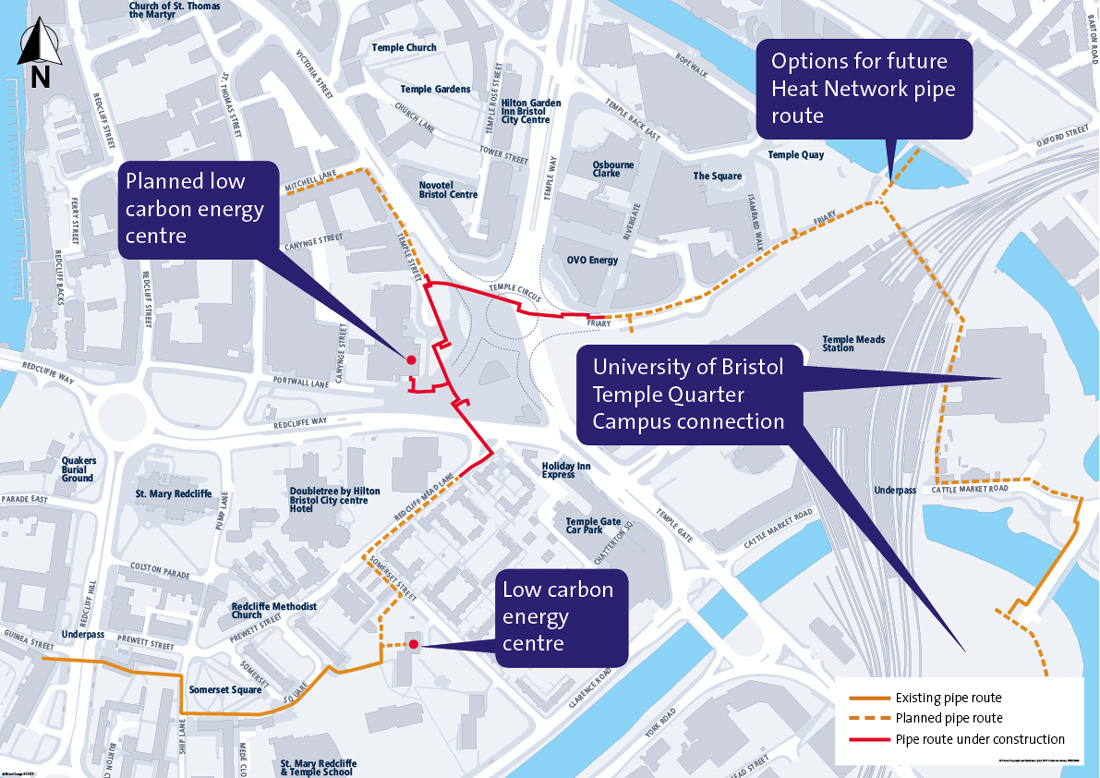New Bristol Workspace Tops Out
The Welcome Building, a 207,000 sq ft landmark in Bristol city centre, has reached its topping-out construction milestone. A joint venture between EPISO 5 and Candour,...
Read Full ArticleIn order to become a carbon-neutral city, Bristol is making radical changes to its heating network.
Heat networks are commonplace in Europe, but less so in the UK. Copenhagen is a great example of a heat network success story, forming a cornerstone of the city’s plan to be net-zero carbon by 2025. Greater Copenhagen’s district heating system forms two tracks, a water-based DH system and a steam-based system, and as a whole supplied power to 64 per cent of the city’s households in 2019.
Bristol is looking to replicate some of this success. The network will replace individual buildings’ own heating systems, and often uses heat recovered from industry or renewable sources.
Heating and hot water currently account for 40 per cent of energy-related carbon dioxide emissions worldwide, and 40 per cent of Bristol’s emissions come from heating homes and workspaces.
Bristol’s heat network currently supplies more than 1,000 properties with low carbon heat from different sources across the city and continues to expand to new areas.
Essentially, it’s a network of underground pipes that will deliver affordable, low-carbon heat and energy across the city. Heat networks draw their heat from many different sources – from the river to sewers to underground geothermal.

Picture: a map of Bristol showing the plans for the heat network. Image credit: Energy Service Bristol
Connection to a heat network is simpler than installing boiler plant equipment in individual buildings as these are replaced by a single heat substation. This means procurement, capital, operational, maintenance and replacement costs are lower than conventional heating solutions.
Heat substations also require a much smaller footprint than conventional gas boilers, increasing the lettable/saleable floor area of developments.
Additionally, because the heat network can adjust the temperature and volume of heat delivered to match exceptional periods of cold weather, it’s no longer necessary to oversize heating systems, meaning they are cheaper to install and maintain and operate more efficiently.
District heat can provide energy security and resilience in a volatile energy market, as well as reducing the proportion of household income spent on energy and incidences of fuel poverty.
Picture: a photograph of Bristol's Clifton Suspension Bridge
Article written by Ella Tansley | Published 09 December 2021
The Welcome Building, a 207,000 sq ft landmark in Bristol city centre, has reached its topping-out construction milestone. A joint venture between EPISO 5 and Candour,...
Read Full ArticleKnight Frank has awarded QTEC Facilities Management a contract to deliver facilities management services at Glass Wharf in Bristol. Glass Wharf is an eight-storey...
Read Full ArticleA sustainable office has become the third building in Bristol to achieve a NABERS Design for Performance Target Rating of 5 Stars. A joint venture between EPISO...
Read Full ArticleA new low-carbon infrastructure project will power the Houses of Parliament and the National Gallery. The South Westminster Area Network (SWAN) will be one of the...
Read Full ArticleLancer Scott Facilities Management has won the hard FM contract at the University of the West of England in Bristol. The FM firm has a previous relationship with the...
Read Full ArticleBath and North East Somerset, Swindon and Wiltshire Integrated Care Board has appointed Willmott Dixon to build a new mental health unit in Bristol. The new facility...
Read Full ArticleThis month's high performing building roundup includes an airport terminal that resembles a garden, a contemporary workspace...
Read Full ArticleA landmark project to protect the historic ironwork at Clifton Suspension Bridge will begin in April 2024. Funded entirely by tolls to the Grade 1 listed bridge across...
Read Full ArticleEquans, a subsidiary of the Bouygues group, is to sell its UK district heating and cooling network portfolio to a consortium formed by Swiss Life Asset Managers and...
Read Full ArticleHSBC will move 270 employees from its Temple Quay base into EQ Bristol, a new workspace due to open in Q3 of 2023. The bank will take 11,000 sq ft of the 200,000 sq ft...
Read Full Article